Clade bivalvia - Study guides, Class notes & Summaries
Looking for the best study guides, study notes and summaries about Clade bivalvia? On this page you'll find 6 study documents about Clade bivalvia.
All 6 results
Sort by
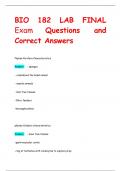
-
BIO 182 LAB FINAL Exam Questions and Correct Answers
- Exam (elaborations) • 21 pages • 2024
- Available in package deal
-
- $10.49
- + learn more
Phylum Porifera Characteristics Answer- - sponges - considered the basal animal - sessile animals - lack true tissues -filter feeders -hermaphrodites phylum Cnidaria characteristics Answer- - have true tissues -gastrovascular cavity -ring of tentacles with cnidocytes to capture prey - polys and medusa phylum Platyhelminthes Answer- flatworms -dorsoventrally flattened bodies - Flat shape increases surface area for nutrient, gas, and waste exchange - Found in marine, freshwater, ...
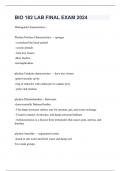
-
BIO 182 LAB FINAL EXAM 2024
- Exam (elaborations) • 11 pages • 2024
-
Available in package deal
-
- $13.99
- + learn more
Distinguish Characteristics - Phylum Porifera Characteristics - - sponges - considered the basal animal - sessile animals - lack true tissues -filter feeders -hermaphrodites phylum Cnidaria characteristics - - have true tissues -gastrovascular cavity -ring of tentacles with cnidocytes to capture prey - polys and medusa phylum Platyhelminthes - flatworms -dorsoventrally flattened bodies - Flat shape increases surface area for nutrient, gas, and waste exchange - Found in mar...
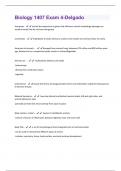
-
Biology 1407 Exam 4-Delgado Latest(2024/2025) Updated Questions and Answers with complete solutions.
- Exam (elaborations) • 8 pages • 2024
- Available in package deal
-
- $7.99
- + learn more
Hox genes - control the expression of genes that influence animal morphology (sponges are simple animals that do not have Hox genes) acoelmates - triploblastic animals without a coelom, their bodies are solid and have no cavity. Ancestors of animals... - diverged from ancient fungi, between 675 million and 800 million years ago, believed to be a suspension feeder similar to Choanoflagellates Animals are.. - -multicellular (without cell walls) -heterotropic -develop from embryonic layers ...
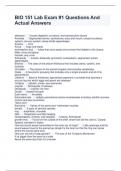
-
BIO 151 Lab Exam #1
- Exam (elaborations) • 3 pages • 2024
-
- $11.49
- + learn more
BIO 151 Lab Exam #1 Questions And Actual Answers abdomen - houses digestive, excretory, and reproductive viscera Annelida - Segmented worms, earthworms; anus and mouth; closed circulatory system; nervous system; setae-bristle appendages Anterior - front Anura - frogs and toads archinephric duct - tubes that carry waste and connect the bladder to the cloaca. Male: urine and sperm Female: only urine Arthopoda - Insects: bilaterally symmetric; exoskeleton; segm...
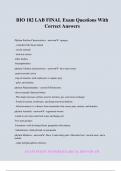
-
BIO 182 LAB FINAL Exam Questions With Correct Answers
- Exam (elaborations) • 8 pages • 2024
- Available in package deal
-
- $10.49
- + learn more
BIO 182 LAB FINAL Exam Questions With Correct Answers Phylum Porifera Characteristics - answer- sponges - considered the basal animal - sessile animals - lack true tissues -filter feeders -hermaphrodites phylum Cnidaria characteristics - answer- have true tissues -gastrovascular cavity -ring of tentacles with cnidocytes to capture prey - polys and medusa phylum Platyhelminthes - answerflatworms -dorsoventrally flattened bodies - Flat shape increases surface area for nutrient, gas, ...
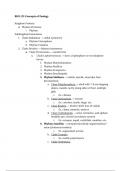
-
BIOL 211 Concepts of Zoology Full Phylum Tree
- Summary • 5 pages • 2024
- Available in package deal
-
- $7.99
- + learn more
BIOL 211 Concepts of Zoology Full Phylum Tree covering topics of kingdom protista, subkingdom eumetazoa, bivalvia, phylum chordata, subphylum craniata, etc.

How much did you already spend on Stuvia? Imagine there are plenty more of you out there paying for study notes, but this time YOU are the seller. Ka-ching! Discover all about earning on Stuvia


